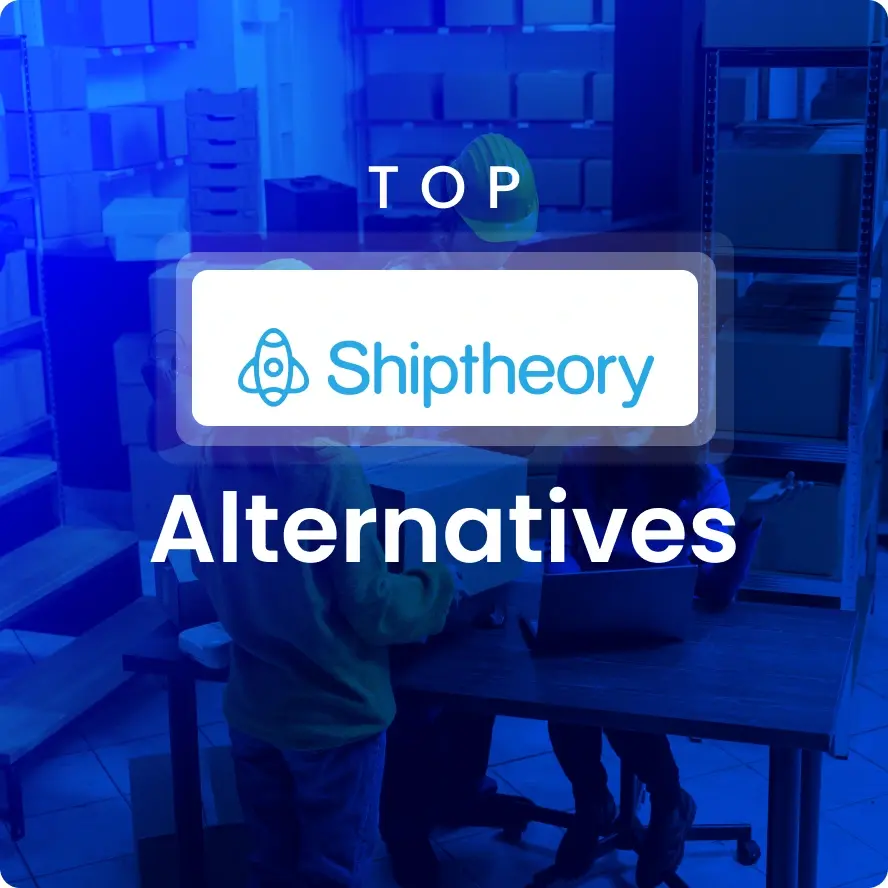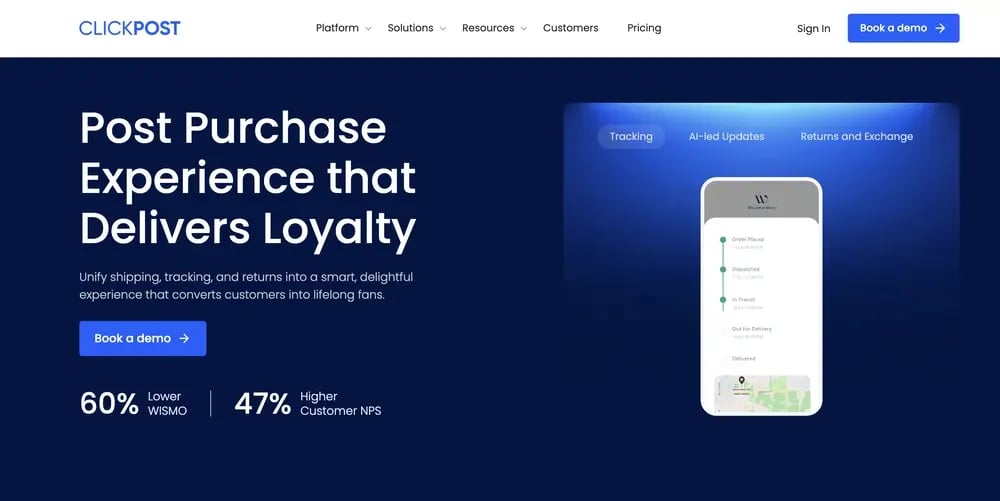Looking for Shiptheory Competitors and Alternatives?

What we’ll cover
Introduction
Shiptheory has earned a loyal user base among eCommerce businesses for its simple label printing, strong courier integrations, and automation capabilities. It connects online stores directly with shipping carriers, automates label creation, and enables rule-based carrier allocation.
Shiptheory also supports international shipping through paperless customs documents, branded tracking, and real-time status updates. However, as logistics needs evolve, many businesses are now actively seeking alternatives. Whether for greater control, deeper integration, improved tracking, or cost efficiency, the search for the right shipping software is on.
Why businesses are looking for Shiptheory alternatives?
Shiptheory provides a clean experience for basic shipping workflows, but many businesses today demand more. The platform's limitations begin to surface when scaling up or seeking more granular customization.
For example, larger businesses often require better tracking tools, easy shipping label generation, broader data insights, and automation options beyond standard rule sets.
Additionally, Shiptheory’s label printing automation, while reliable, can fall short when compared to platforms offering branded, multi-channel returns and full post-purchase experience management.
Here are a few key reasons users explore alternatives:
-
Limited scalability: Suits smaller brands but lacks enterprise-grade automation or warehouse integration.
-
Basic analytics and tracking: Not ideal for teams wanting advanced insights or branded communication flows. As per reviews, users find it hard to track orders through their account.
-
Pricing mismatch: May not justify value for mid-market or larger businesses needing a broader feature set.
-
International shipping limitations: Document automation exists, but some rivals offer deeper functionality.
-
Returns experience: Not built for full-cycle returns and customer-driven workflows.
Top 10 Shiptheory alternatives to consider in 2025
Let us now look at some of the best Shiptheory competitors, starting with ClickPost, known for its powerful shipping automation, tracking analytics, and global courier integrations.
1. ClickPost

ClickPost is a robust cloud based solution and shipping software used by leading eCommerce enterprises for streamlining their logistics operations. It supports integrations with over 500+ carriers, 3PLs, sales channels, eCommerce marketplaces, and storefronts. Unlike Shiptheory, ClickPost offers features built for scalability, real-time intelligence, and deeper returns automation to reduce human error and save time.
Key Features
-
A unified dashboard with smart allocation across multiple carriers using branded shipping rules
-
Integrated tracking dashboard with WhatsApp/SMS/Email milestone notifications
-
NDR and NPR management portals to reduce RTO and missed pickups
-
AI-led returns portal that automates return approvals, pickup rules, and refund timelines
-
Real-time SLA breach monitoring, serviceability checks at checkout, and COD reconciliation
ClickPost stands out because it addresses gaps left by Shiptheory in returns, post-purchase experience, and tracking parcel statuses. It offers end-to-end shipping services to simplify the shipping process and ensure post-purchase experience is optimal for all customers.
Pricing is custom-based, starting from mid-tier business requirements, making it highly scalable without compromising on features and delivering the ultimate advantage.
2. ShipStation

ShipStation is a well-known shipping automation software that helps small—and mid-sized businesses streamline fulfillment. It has ready-to-go connections with online stores, marketplaces, and major carriers and offers discounted shipping rates to reduce money spent on delivery.
Key features:
-
Supports over 100 carriers globally with batch label printing
-
Offers branded tracking pages and automated returns workflows
-
Real-time shipping rate comparison at checkout
-
Rule-based automation for splitting, combining, or routing orders
While ShipStation offers strong label printing and order syncing features which is great for new orders, it lacks the depth of returns intelligence and smart NDR workflows that ClickPost offers.
3. AfterShip

AfterShip focuses on enhancing post-purchase engagement and customer experience. Its core features include shipment tracking, branded pages, and notification automation.
Key features:
-
Branded tracking pages with upsell recommendations
-
Notification triggers through email, SMS, and WhatsApp
-
Returns portal with configurable rules and workflows
-
Analytics dashboard for customer feedback and delivery insights
AfterShip's strengths lie in the customer engagement space. It is a strong Shiptheory alternative if post-purchase visibility and communication are top priorities. Pricing starts from a free tier with paid options for advanced features.
4. parcelLab

parcelLab specializes in turning operational data into a communication opportunity. It helps businesses take control of the post-checkout experience.
Key features:
-
Branded post-purchase emails triggered by shipment milestones
-
End-to-end order journey updates in real time
-
Advanced rules for delay notifications, pickup reminders, etc.
-
In-depth insights into delivery performance and customer behavior
ParcelLab can work alongside traditional WMS or TMS tools, offering more control over tracking communications compared to Shiptheory. Pricing is custom and is tailored for mid-sized and large retailers.
5. Easyship

Easyship is a global shipping platform that simplifies international shipping. It is ideal for SMBs aiming to expand globally with minimal setup.
Key features:
-
Real-time tax, duty, and courier rate calculations
-
Access to discounted global carrier rates
-
Automated shipping label creation and customs documentation
-
Integration with Shopify, WooCommerce, BigCommerce, etc.
Easyship is a worthy alternative for businesses needing simplified cross-border solutions. It offers a free plan for low-volume shippers and scales up with usage.
6. ShippingEasy

ShippingEasy offers simple automation for smaller online sellers who need help managing orders, labels, and email marketing.
Key features:
-
Email automation tools built into the shipping dashboard
-
Multi-carrier rate comparison and label generation
-
Inventory sync and alerts for low stock
-
Simple rule-based automation for daily shipments
While not as advanced in tracking or analytics, ShippingEasy is a budget-friendly Shiptheory alternative, especially for retailers in early growth stages.
7. ShippyPro

ShippyPro helps retailers handle shipping, label generation, returns, and analytics through a clean and user-friendly interface.
Key features:
-
Connects with over 170 carriers
-
Smart shipping rules for bulk order management
-
Branded return portal with customizable rules
-
API and CSV-based integrations
ShippyPro’s pricing is structured across tiers based on shipments per month. Compared to Shiptheory, it offers more control over branding and multi-language returns experiences.
8. ShipWorks
ShipWorks is desktop shipping software with strong warehouse automation workflows. It is more suited to high-volume shippers and hybrid warehouse teams.
Key features:
-
Bulk shipment automation using scan-based workflows
-
Connects with FedEx, UPS, USPS, DHL, and custom carriers
-
Advanced filter rules for rate shopping and package routing
-
Desktop-based UI with limited cloud dependency
While ShipWorks excels in warehouse settings, it may lack the full-cloud flexibility and branded UX features offered by platforms like ClickPost.
9. Ordoro

Ordoro provides order fulfillment, inventory management, and shipping automation for scaling businesses. It supports dropshipping, multi-channel fulfillment, and vendor routing.
Key features:
-
Unified dashboard to manage orders, inventory, and suppliers
-
Auto-assign shipping rules and create workflows
-
Print shipping labels and manage product bundles
-
Support for kitting, barcode scanning, and vendor dropshipping
Ordoro is a solid fit for operationally complex businesses and stands apart with its integrated inventory features. Pricing starts at $59/month, with higher tiers offering expanded functionality.
Key considerations when choosing a Shiptheory alternative
When deciding on a new shipping platform, businesses must assess their operational complexity, integration needs, and customer experience goals. Here are some factors to consider:
1. Multi-carrier support
If your business ships using various carriers, ensure the alternative supports seamless rate comparison and carrier switching. ClickPost, for example, integrates with 200+ carriers and uses AI to recommend the most cost-effective and reliable shipping methods.
2. Integration with eCommerce platforms
Look for platforms that support plug-and-play or API-based integration with platforms like Shopify, Magento, WooCommerce, and ERP systems. The easier the integration, the faster your go-live timeline.
3. Shipping rate comparison and optimization
A strong alternative should help you compare courier rates in real time, automate carrier selection based on weight, value, or SLA, and optimize for cost and speed.
4. Reporting and analytics
Data-driven decisions matter. Alternatives like ClickPost and AfterShip offer real-time insights into delivery performance, customer satisfaction, and returns trends.
5. Real-time tracking and notifications
Proactive updates enhance customer experience. Tools that offer branded tracking pages and milestone-triggered notifications reduce WISMO queries and increase transparency.
Transform your shipping solution with ClickPost – Discover why it is the superior choice to Shiptheory!
ClickPost offers everything Shiptheory does—plus a whole lot more. Whether it is branded returns, smart tracking notifications, or flexible integration models, ClickPost offers a more scalable and intelligent alternative. It is ideal for growing businesses that want a complete logistics automation suite without being boxed into basic workflows.
Looking for the best Shiptheory alternative? Book your free ClickPost demo today and explore how smarter shipping can drive better customer experience and operational efficiency.
Conclusion: Which Shiptheory alternative is best for your business?
Every shipping solution serves a different need. Shiptheory has served small to medium eCommerce teams well, but alternatives like ClickPost, AfterShip, or parcelLab provide broader capabilities across tracking, automation, and post-purchase engagement.
If you are a scaling business with complex logistics workflows and a growing customer base, ClickPost’s capabilities in NDR handling, SLA monitoring, and branded returns portals may provide the operational depth you need. Meanwhile, smaller brands may still find value in ShipStation or Easyship for low-cost international fulfillment.
Ultimately, choosing the right platform means aligning with your operational goals, customer experience priorities, and budget. The right alternative will not just match Shiptheory—it will surpass it in areas where your business is ready to grow.


.png?width=879&height=549&name=Page%2074%20(1).png)